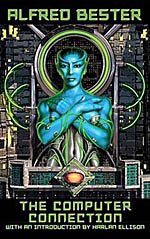
![]() couchtomoon
couchtomoon
8/3/2016
![]()
Bester. If you've had any experience with his short fiction, or even his most famous novel, the first ever Hugo-winning novel, The Demolished Man (1952), you know he unleashes his prose at a gallop, with punchy, dynamic lingo that jabs, cuts, and bruises with unrelenting speed. The Demolished Man is special because that signature bold style is razor-sharp perfect for the unlikeable sociopathic protagonist and his foul point-of-view shaped by Freudian theory and old-fashioned mores. It's a novel that's powered by grating absurdity and ugly humanity, and could potentially put off modern readers not expecting such strong, repugnant flavors (and the taint of the poorly aged). Yet it's a clever and transcendent way of telling a story about a guy attempting to literally get away with murder, in a telepathic world, no less.
Then there's The Computer Connection, a sort of "coming out of writer retirement" novel twenty-five years later. General reputation alone suggests that The Computer Connection is not Bester's best work, but I suspect those 1970's negative reviews hinge primarily on, oh, I don't know, the unwieldy premise, the throwaway absurdities, the stock characters, and other general nonsense, all of which I could handle if the nonsense amounted to any sort of entertainment. But on top of being the kind of nonsense you have to work at to even remotely care about, it's also terribly, terribly offensive, and not in a Ballardian "look at how terrible this is" kind of way, but serves only to stroke the ego of a disconnected, irrelevant writer-hero lost in the ironic quagmire of the New Wave. (Not that he was the only one.)
Where to begin? The racist jokes? The topless thirteen-year-old Asian servant girl? THE TERRIBLE PUNS? I'm most annoyed by Bester's use of what he calls "Black Spanglish," a mix of what he thinks is Black American English and borderland Spanish that looks more like Ignorant White Mockery. In the novel, "Black Spanglish" has superseded what's characterized as default English, "English XX" (20th century English, but he's also trying to be cheeky with another dumb pun), as if that's the "correct" version of English, as if it's never evolved before. From a more in-tune writer, this might be an interesting look at linguistics and cultural evolution, but Bester puts it on like a bad Groucho Marx mustache that makes him look like a trippin' pendejo.
Too bad the book sucks on so many levels because he is a study in linguistic energy and efficiency. In verbs. In adjectives. (Definitely not cross-culturally, though, apparently.) It's also a shame because the story introduces a couple of interesting concepts: the idea that "catastrophism" in death will induce a kind of immortality, and the possible biological consequences of cryogenics -- both involve completely bizarre and unusual depictions that grab interest.
Instead, he seems to throwaway these neat concepts in order to set up more dumb and offensive jokes. I say "he seems to" because I gave up close to the halfway point, thus allowing The Computer Connection to join the ranks of Time Enough for Love (1973) as the only two novels I have DNFd in the history of this blog. Mr. Bester, you have surpassed the limits of my interminable tolerance.
It's the worster.
http://couchtomoon.wordpress.com